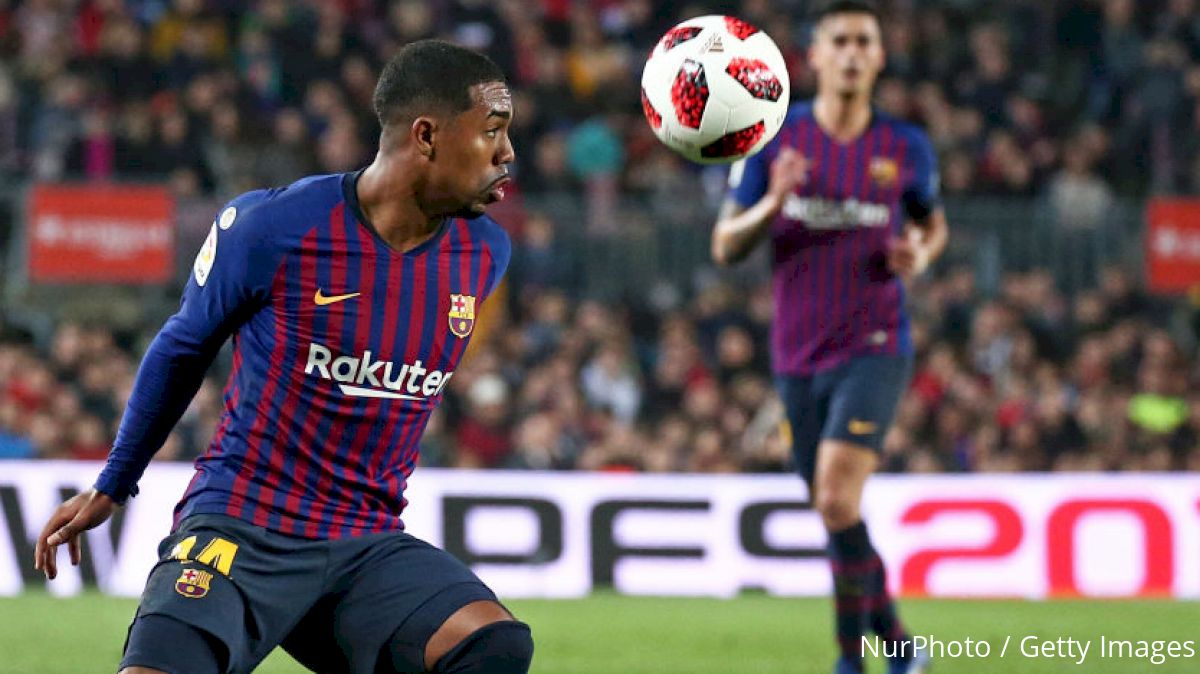Amid Malcom-to-Tottenham Rumors, Is Barcelona's Transfer Policy Failing?
Amid Malcom-to-Tottenham Rumors, Is Barcelona's Transfer Policy Failing?
Amid rumors that Barcelona could offload Malcom to Spurs, FloFC takes a deep dive into the shortcomings of FC Barcelona's transfer policy.

If recent, and extensive, transfer reports are to be believed, then Barcelona appear to be in negotiations with Tottenham Hotspur for the loan transfer of their wide man, Malcom.
Any deal would, allegedly, include a compulsory purchase option at the end of the current season, meaning that the 21-year-old Brazilian is shipped off to the Premier League just six months after his summer move.
A move which was clouded in controversy from the beginning, let’s not forget.
With supporters of A.S. Roma gathering at the airport waiting for the player to arrive from Bordeaux, news filtered through of a delay. Despite agreeing on everything with the Italian club, the youngster had seemingly had an 11th-hour change of heart.
It soon became clear that Barcelona’s aggressive pursuit of the lightning-quick winger was going to be successful, and no sooner had that deal been concluded, than Malcom was shipped out of harm’s way and on a plane to the USA and Barça’s preseason tour.
A tour where he came on as a substitute against his potential future employers, whilst Roma’s sporting director, Monchi, was left considering his options in legal terms.
Making such a play for a new signing would indicate the regard in which they held him, and surely it would be a foregone conclusion that he’d be a fixture in the starting XI before long, right?
Wrong.
Something seemed amiss from the very beginning, and when the Brazilian wasn’t being named in the XI or even in the squad on occasions, it rightly led to an incessant line of questioning from the media.
Ernesto Valverde and Pep Segura, the general manager of the football area at FCB, had to repeat, parrot-fashion, that Malcom was an important part of the squad. But his importance, evidently, didn’t translate into minutes on the pitch, because to date, he’s played just 97 minutes in La Liga.
“We signed him because he has talent,” Segura told SPORT in October 2018. “Now he’s not getting minutes but there’s no problem with the staff or anyone. He will have minutes because the season is long.”
That last sentence is beginning to look a little hollow now, and rumors that Valverde never wanted him in the first place won’t go away either, whatever Segura says.
The signing, and subsequent realization that perhaps a mistake had been made, has echoes of the Yerry Mina transfer from January of last year, which begs the question as to whether the club’s transfer policy is failing? Maybe those in the scouting department need to take a long, hard look at themselves, too.
Barcelona even paid a premium to bring Mina to Catalonia six months early, and just because they turned a profit on his transfer to Everton after he’d had a great World Cup with Colombia, it doesn’t excuse the fact that they got the fundamentals wrong again, with regards to what it is that they thought the player could bring to the table.
“From the economic point of view, yes,” Segura added when asked if he felt Mina’s transfer had been a success. “From the sporting point of view, we would’ve liked him to have adapted and played. That didn’t happen but at least we got some value out of it.”
Adapted? Within five months of arriving on a continent he’d never lived in, playing a style of football he wasn’t used to and at a level he’d not been at for most of his club career? A little harsh don’t you think?
Perhaps the issue of adaptation needs to be addressed in more depth.
Why is it that more La Masia players aren’t finding their way into Barcelona’s first team? Sergi Roberto has made his mark and one or two others are now coming through, but it’s only a trickle of players capable of making the step up to the first team.
Arguably, the failure of the academy, in general terms, is why the Blaugrana have had to go to the market in the first place, moving further and further away from what the ethos of the club is in the process.
This precise situation could’ve been foreseen, too.
Back in July 2015, this writer met former Barcelona president, Joan Laporta, in a one-on-one interview the day before the club’s presidential elections. Some of what he talked about three and a half years ago could be said to still hold true today.
“La Masia is one of our pillars. In our model we have a genuine style of playing football from Johan Cruyff. A style of football that has been recognized and admired by all the world,” he said. “La Masia is our academy. It's our dreams factory. When a kid arrives at Football Club Barcelona at nine years old, he has a dream and we have the coaches that try to make real that dream.
“And the dream is real when the player, the young guy, does well after a long process and arrives at the first team. There are a lot of people involved in this process — coaches, teachers — because first we try to educate young people, and then they have to be good players.”
Josep Maria Bartomeu won the vote the day after the interview, although Laporta did want to dwell on the fact that the club were already heading down a route employed by their biggest rivals, Real Madrid, in terms of “galactico” type signings.
“Well, it's a different model,” Laporta said. “One of my opponents is changing our model and this is the reason why I am ‘running’ to the elections.
“We think that the best model is a model that has La Masia, our academy, as a system to make the club sustainable. Not just sportingly, economically as well. In my opinion, these opponents decided to extinguish La Masia.
“For them it was easier to go to the market than work very hard in order to create players like Valdes, Pique, Puyol, Xavi, Iniesta, Busi, Pedro and, of course, Messi. This takes time. It takes a big effort to develop this system and it’s a long process.
“I think that it is much better for the club to have La Masia as a pillar of the model of managing the club than to have another system that continues to go to the market.”
With players’ salaries also spiraling to record levels, cost savings need to be made somewhere, and player sales seems to be an obvious start point.
But when those same players have only just been secured, then questions will continue to be asked as to what exactly is Barcelona’s modus operandi for the short to medium term?
Jason Pettigrove is an experienced freelance football journalist, editor, and published author who specializes in La Liga and the major European leagues. Find him on Twitter @jasonpettigrove.
Related Content
 How to Watch: 2024 Smith College vs Springfield - Women's | Soccer
How to Watch: 2024 Smith College vs Springfield - Women's | SoccerMar 14, 2024
![How to Watch: 2024 Salve Regina vs Wellesley College[a] - Women's | Soccer](https://d2779tscntxxsw.cloudfront.net/5d1b91f16a42a.png?width=400&quality=80) How to Watch: 2024 Salve Regina vs Wellesley College[a] - Women's | Soccer
How to Watch: 2024 Salve Regina vs Wellesley College[a] - Women's | SoccerMar 14, 2024
 How to Watch: 2024 Mount Holyoke College vs W.P.I. - Women's | Soccer
How to Watch: 2024 Mount Holyoke College vs W.P.I. - Women's | SoccerMar 14, 2024
 How to Watch: 2024 Emerson College vs M.I.T. - Women's | Soccer
How to Watch: 2024 Emerson College vs M.I.T. - Women's | SoccerMar 14, 2024
![How to Watch: 2024 Wellesley College[a] vs M.I.T. - Women's | Soccer](https://d2779tscntxxsw.cloudfront.net/5d1b91f16a42a.png?width=400&quality=80) How to Watch: 2024 Wellesley College[a] vs M.I.T. - Women's | Soccer
How to Watch: 2024 Wellesley College[a] vs M.I.T. - Women's | SoccerMar 14, 2024
 How to Watch: 2024 Babson College vs Clark - Women's | Soccer
How to Watch: 2024 Babson College vs Clark - Women's | SoccerMar 14, 2024
 How to Watch: 2024 Springfield vs Babson College - Women's | Soccer
How to Watch: 2024 Springfield vs Babson College - Women's | SoccerMar 14, 2024
 How to Watch: 2024 W.P.I. vs Emerson College - Women's | Soccer
How to Watch: 2024 W.P.I. vs Emerson College - Women's | SoccerMar 14, 2024
 How to Watch: 2024 United States Coast Guard Academy vs Salve Regina - Women's | Soccer
How to Watch: 2024 United States Coast Guard Academy vs Salve Regina - Women's | SoccerMar 14, 2024